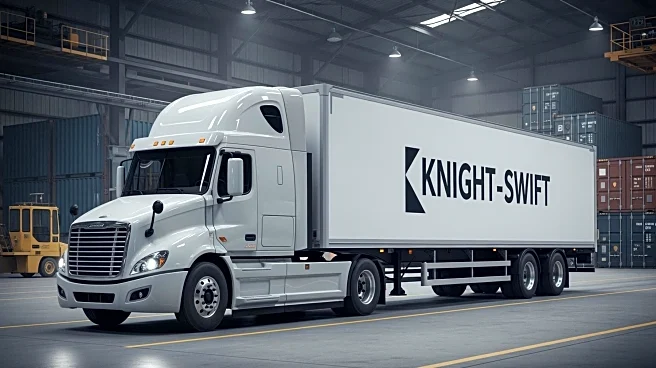What's Happening?
Knight-Swift Transportation, a major player in the trucking industry, experienced a 6% drop in its share price following the release of its third-quarter earnings report. The company reported earnings of 32 cents per share, which fell short of analyst
expectations of 37 cents per share, according to FactSet. Despite this earnings miss, Knight-Swift's revenue for the quarter was $1.93 billion, surpassing the consensus estimate of $1.9 billion. This mixed financial performance has led to a negative reaction in the stock market, reflecting investor concerns over the company's profitability.
Why It's Important?
The earnings miss by Knight-Swift Transportation is significant as it highlights potential challenges within the trucking industry, which is a critical component of the U.S. supply chain. The company's ability to generate revenue above expectations suggests strong demand for its services, yet the lower-than-expected earnings indicate rising costs or operational inefficiencies that could impact profitability. This development may influence investor sentiment and lead to increased scrutiny of the trucking sector's financial health. Companies in this industry are vital for the movement of goods across the country, and any financial instability could have broader implications for supply chain operations and economic activity.
What's Next?
Knight-Swift Transportation may need to address the factors contributing to its earnings shortfall to reassure investors and stabilize its stock price. This could involve cost-cutting measures, operational improvements, or strategic investments to enhance efficiency. Additionally, the company might provide updated guidance or insights into its future performance to mitigate investor concerns. Stakeholders, including investors and industry analysts, will likely monitor the company's actions closely to assess its ability to navigate current challenges and improve profitability.
Beyond the Headlines
The trucking industry's financial performance can have ripple effects on various sectors, including retail, manufacturing, and agriculture, which rely heavily on efficient transportation networks. Knight-Swift's earnings miss may prompt discussions about the sustainability of current business models in the face of rising costs, regulatory changes, and evolving market demands. Long-term shifts in logistics and transportation strategies could emerge as companies seek to balance profitability with service quality and environmental considerations.
















